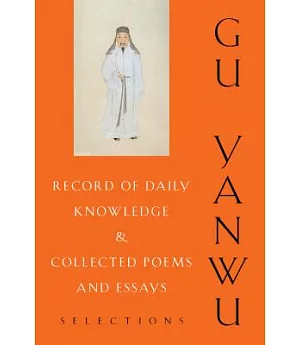"A selection of Qing Dynasty scholar Gu Yanwu’s general writings from his Rizhi lu (Record of Daily Knowledge) and his Tinglin Shiwenji (Collected Poems and Essays). Gu Yanwu is regarded as the
progenitor of the dominant scholarly trend of late Ming and early Qing-era China, known as Han Learning or Evidential Learning, which placed emphasis on practical learning instead of theory. He
insisted that scholars must undertake wide and varied research on practical subjects and return to the simple, ethical precepts of early Confucianism. His best known and most significant work
is his Record of Daily Knowledge, a collection of his short essays on problems in the classics, government, economics, the examination system, literature, history, and philology. The writings
were composed during Gu’s years of travels around China after the fall of the Ming Dynasty, and are based on personal observation and wide reading in the classics of Confucian thought. They
are, as Gu himself said, ’not old coin but copper dug from the hills.’ Like many scholars of the time, Gu believed that one of the fatal weaknesses of the Ming had been an overconcentration of
power in the central government. He therefore recommended a decentralization of authority and the strengthening of local self-government in the provinces. Johnston’s translation of selections
from A Record of Daily Knowledge and Collected Poems and Essays includes a general introduction covering Gu’s personal history, his published works and his main ideas together with some
consideration of subsequent evaluations of his importance"--Provided by publisher.

